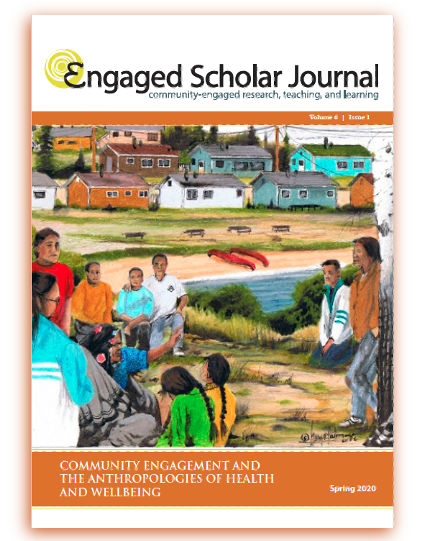Reconnecting through Urban Agriculture: A community-engaged video ethnography in Winnipeg
Keywords:
urban agriculture; video ethnography; community-engaged learning, reciprocity; urban reconnectionAbstract
Abstract: While contemporary urban life in many ways seems increasingly disconnected from nature, the growing practice of urban agriculture – growing food in and around cities – is increasingly pointed to as a source of well-being through a connection to the land. In addition to providing access to healthy food and providing a means for increased physical activity, urban agriculture boasts a number of subjective positive experiences for participants. Reporting from an intensive, community-based ethnographic research project in Winnipeg, Manitoba, students and course organizers of the University of Manitoba’s “Applied Visual Methods in Community-Based Sociology” course explored urban agriculture as a source of well-being through the lens of disconnection and reconnection. During the summer course, eight students from different disciplinary backgrounds conducted participatory observation and interviews in five community garden sites. The results of the research were developed in a group paper and presented in a short video. This report from the field shares the methodology of short-term ethnographic video as a means of both engaged scholarship through the principle of reciprocity and as a vehicle for exploring urban agriculture (and other food movement activities) as a pathway to well-being by reconnecting to land, to food and to community.
References
Beaulieu, M., Breton, M., & Brousselle, A. (2018). Conceptualizing 20 Years of Engaged Scholarship: A Scoping Review. Plos One, 13(2), 1–17. http://doi.org/10.1371/journal.pone.0193201
Maiter, S., Simich, L., Jacobson, N., & Wise, J. (2008). Reciprocity: An Ethic for Community-Based Participatory Action Research. Action Research, 6(3), 305–325. http://doi.org/10.1177/1476750307083720
Mathews, G., & Izquierdo, C. (2009). Anthropology, Happiness, and Well-Being. In G. Mathews & C. Izquierdo (Eds.), Pursuits of Happiness: Well-being in Anthropological Perspective (pp. 1–21). New York and Oxford: Berghagn Books.
Nykiforuk, C. I. J., Vallianatos, H., & Nieuwendyk, L. M. (2011). Photovoice as a Method for Revealing Community Perceptions of the Built and Social Environment. International Journal of Qualitative Methods, 10(2), 103–124. http://doi.org/10.1177/160940691101000201
Pink, S., & Morgan, J. (2013). Short-Term Ethnography: Intense Routes to Knowing. Symbolic Interaction, 36(3), 351–361. http://doi.org/10.1002/symb.66
Santo, R., Palmer, A., & Kim, B. (2016). Vacant Lots to Vibrant Plots: A Review of the Benefits and Limitations of Urban Agriculture. John Hopkins Centre for a Livable Future.
Shrum, W. M., & Scott, G. G. S. (2016). Video Ethnography in Practice: Planning, Shooting, and Editing for Social Analysis. Thousand Oaks: Sage Publications.
Published
Issue
Section
License
Authors who publish with this journal agree to the following terms:
- Authors retain copyright and grant the journal right of first publication with the work simultaneously licensed under a Creative Commons Attribution License CC BY 4.0 that allows others to share the work with an acknowledgement of the work's authorship and initial publication in this journal.
- Authors are able to enter separate, additional contractual agreements for the non-exclusive distribution of the journal's published version of the work (e.g., post it to an institutional repository or publish it in a book), with an acknowledgement of its initial publication in this journal.
- Authors are permitted to post their work online (e.g., in an institutional repository or on their website) after the publication of their work in the Engaged Scholar Journal.
- Please note that while every opportunity will be taken to ensure author participation in the editing process, due to time constraints final copyediting changes may be made before publication to ensure APA adherence throughout all submissions.




